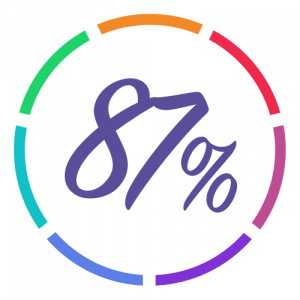87% is a clinically-led, digital platform that empowers users to take charge of their mental wellbeing. We facilitate this by providing users with measurable data that makes mental wellbeing tangible and therefore helps them build effective wellbeing strategies, track their progress and make improvements over time.
For users, this consists of personalised guidance from a team of clinical psychologists. The output is tailored to users’ individual goals, to help them build healthy habits. We also offer a full range of professional support.
For businesses, this data is aggregated and anonymously delivered to managers through interactive dashboards, providing deep insights into the wellbeing of staff and the health of the organisation. Managers can see how their staff are faring, focus on the areas of greatest need and develop better long-term mental wellbeing.
The result is a happier workforce, with reduced stress, reduced absenteeism and increased productivity – in simple business terms the ROI on any investment is proven.
The platform is also fully customisable to a company’s branding and the nuances of a particular sector. It signposts and integrates with existing employee assistance programmes and other interventions offered to staff.

How did you come up with the idea for the company?
In a way, 87%’s mission is 200 years in the making. The titans of industry from the 19th Century – the likes of John Cadbury, The Seiffs, Solomon Guggenheim and Titus Salt – grew vast businesses, not by overlooking their employees but by investing in them, their families and society.
This concept, coined ‘philanthrocapitalism,’ spawned a generation of harder working and healthier staff, which led to increased profits. Consumers engaged more with these brands due to their authenticity and purpose.
87% has set out to replicate this for the modern age. Call it ‘Philanthrocapitalism 20.20’ – we want organisations to recognise the benefits of bringing mental wellbeing to life. By using data to really understand the needs of their staff, they can direct appropriate interventions at the right time, thus enhancing productivity and engagement.
More from Interviews
- Meet Jaron Soh, Co-founder & CEO of LGBTQIA+ Mental Wellness App: Voda
- Meet Nathalie Morrison: The Founder Behind Astrea, the Fashion-Tech Brand Putting Lab-Grown Diamonds at the Heart of Luxury
- Meet Badr Ward, CEO And Founder Of Education Platform: Lamsa
- A Conversation with Andrej Persolja, Founder of We Fix Boring
- A Chat with Kebbie Sebastian, CEO and Founder of Merge
- Meet Dr Agnès Leroy, GPU Director at Cryptography Tool: Zama
- Meet Roman Eloshvili, Founder of ComplyControl
- Inside Mobile Payments with Bojoko’s Ville Saari
How has the need for 87% evolved during COVID-19?
Mental wellbeing has been thrust into the spotlight in recent months, not least amongst the medical and emergency service professions. Across the broader workforce, isolation, uncertainty and stress levels have soared and even now our data is showing that loneliness has increased as a result of the second wave of Coronavirus – by 15% since March. This goes to show the extent of the effects of the virus on our wellbeing.
It is for that reason, as well as our belief that mental health is for everyone, not just those suffering from mental ill health, that we worked with our amazing shareholders and organisations such as the Aviva Foundation to secure funding that would allow us to provide our platform to emergency medical staff and SMEs for free throughout the pandemic. Off the back of this, partnerships with medical organisations like the Royal College of Emergency Medicine and Air Ambulances UK have given 30,000 frontline workers vital wellbeing support since March.
But it doesn’t stop there. We’re working hard to support businesses in a variety of sectors – logistics, transport, agriculture, marketing, housing, you name it – making sure they and their employees have the resources required to thrive, despite the difficult circumstances that we’re all facing.
What can we hope to see from 87% in the future?
This is bigger than simply giving people access to an app to track their wellbeing; we consider 87% as much a movement as a business. We want to see a paradigm shift in the mindset of businesses, from the perception that wellbeing is a perk or a benefit, to becoming a basic human right. Mental wellbeing must be regarded as openly and as critically as physical health and invested in accordingly.
We will build on the really strong growth that we’ve seen over recent months by investing more into sales and marketing, data insight, user experience and customer service, all to better engage with our end users and deliver better insight to our clients. We hope to secure funding in the new year to accelerate this and help more businesses to measure, understand and improve the mental health of their employees.



